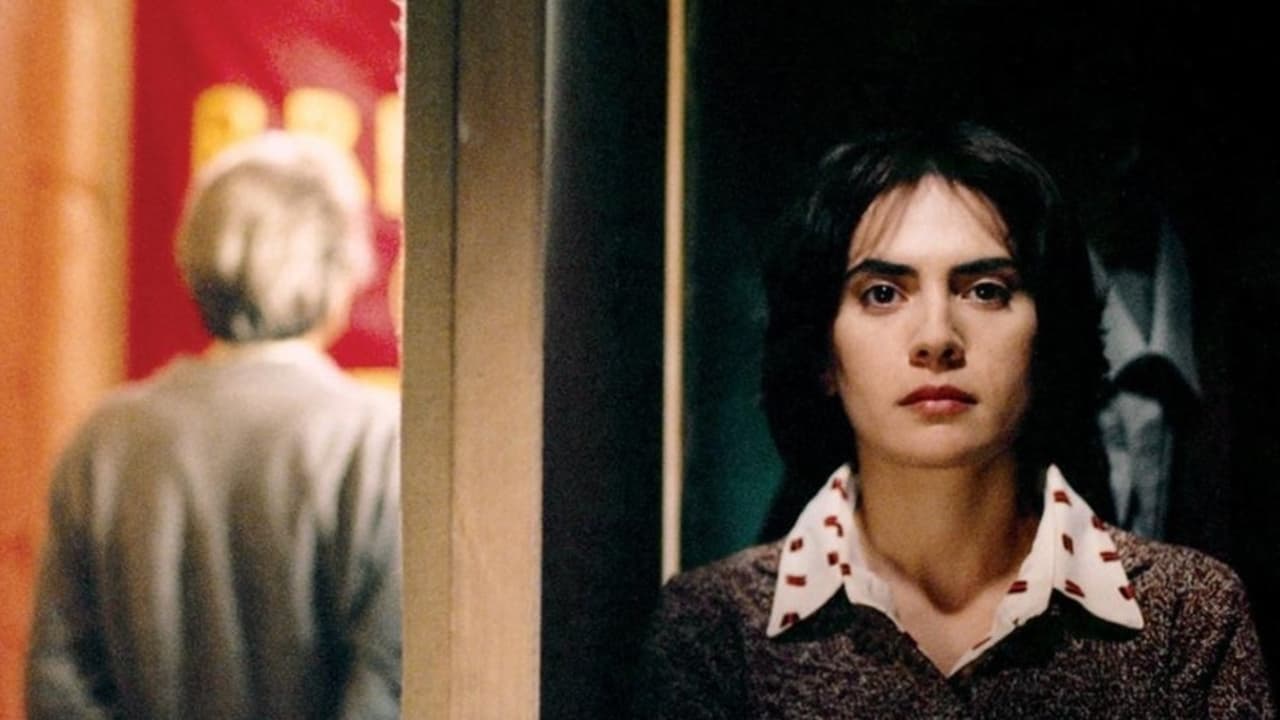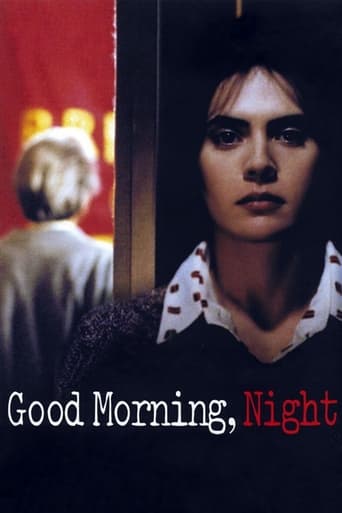



This is one of the few movies I've ever seen where the whole audience broke into spontaneous, loud applause a third of the way in.
View MoreIt's a movie as timely as it is provocative and amazingly, for much of its running time, it is weirdly funny.
View MoreA terrific literary drama and character piece that shows how the process of creating art can be seen differently by those doing it and those looking at it from the outside.
View MoreIt's simply great fun, a winsome film and an occasionally over-the-top luxury fantasy that never flags.
View MoreMost of the positive comments posted here are as verbose as the movie! It takes a long-winded bore to appreciate a wordy and boring film, one supposes. Some have merely called the film "contemplative", meaning slow and devoid of plot, however, one Dutch reviewer hit the nail on the head: this is an important event turned into a dull film whose tone is set in the very first scene. Here a young couple is being shown an apartment by a Realtor who, predictably, talks non-stop and regardless of what else is going on. So does just about every other character!The only silences in this picture are dream sequences--1930's Soviet propaganda snippets--and they are also its most interesting parts. This tells you something about how watchable the rest of the movie is.The device of filming most of the scenes in extreme closeup--as if one were looking through a crack in the blinds--gets old fast.
View MoreThis movie describes the 55 days of captivity of On. Aldo Moro, kidnapped by the Red Brigades in 1978. In rapid strokes, the Red Brigades are presented as a group bent on implementing a Marxist-Leninist revolution in Italy through the destabilization of the Republican democratic state in order to implement a Soviet style dictatorship. The Red Brigades were inspired by the Russian revolution and by the actions of Lenin and his Bolshevik followers. The maxim at the time was "Portare l'attacco al cuore dello stato", i.e. "Bring the attack to the heart of the state" and the Red Brigades extended their campaign of numerous targeted assassinations to those public figures that were trying to dilute the original message of the Marxist-Leninist revolution. On. Aldo Moro, President of the Christian Democratic Party, with his decade of attempts to mediate "Il Compromesso Storico" (The Historic Compromise), i.e., the entrance in the Government of politicians of the Italian Communist Party (Partito Comunista Italiano, PCI), was targeted, kidnapped and assassinated because he was close to succeed in his task. In the Red Brigade's view, the entrance of the PCI in the Government would have betrayed the Leninist dogma of proletarian revolution, and of the planned physical elimination of the middle class (Classe Borghese). Mr. Bellocchio does not delve too deeply into this essential motivations of the Red Brigades, and while he does not embellish their crime, he presents a superficial view of the political debate. I was in Italy when On. Moro was kidnapped and assassinated, and I remember very well those days. The Italian Communist Party (PCI) was very worried that the equation Communism-by-the-book = Red Brigades would cause a loss of votes for the party (30-35% of the electorate voted PCI) and the Italian Right (non-fascist) was too sleepy or ignorant to use the equation in the political debate, i.e. to suggest that communism was a bloody ideology that had at its core the destruction in a blood-bath of all the class enemies. Mr. Bellocchio does not present this political debate and prefers to continue the traditional and superficial approach: the Red Brigades were somewhat romantic criminal assassins. The film would have greatly improved had the most recent development on the significance of Communist Terrorism (especially the magisterial work of Richard Drake on the subject) in the 1960's and 1970's Italy been presented. Because it failed to refresh the trite and regimented view that the Red Brigades were a sort of political criminal folly, Mr. Bellocchio should be commended only because he is the only major movie director daring to dedicate a movie to the still not closed chapter of Marxist-Leninist terrorism in Italy. The movie was produced by the Italian State Television (RAI), and many of the RAI intellectuals are lefties: therefore it is not surprising that the fundamental violence of communism in all its forms had not been presented by the movie. In summary: commendable for reconstructing a painful chapter in the history of the Italian Democracy and for presenting a credible On.Aldo Moro, but missing the most updated debate on the subject and not adding much to the popular mythology.
View More"Good Morning, Night (Buongiorno, notte)" is an intriguing effort to understand terrorists.Loosely based on a novel, writer/director Marco Bellocchio specifically re-imagines the kidnapping of Italian party leader Aldo Moro in 1987, with heavy use of television clips. The quaintly naive Cold War rhetoric, emphasized with odd historic black and white newsreel interstices such as of Stalinist parades, may now be seen as an examination of a symbolic precursor for today's gruesome politics, though he was already working on the film at 9/11.The young idealists we are first introduced to seem as harmless as the radical pranksters in the contemporary "The Edukators (Die Fetten Jahre sind vorbei)." While it's a jolt to gradually learn their connection to the violent attack, first revealed as they cheer at the initial TV coverage, they seem so bumbling and nervous (one takes leave abruptly for, as it were, a conjugal visit as he feels he's the one being imprisoned; another gets fixated on an overly symbolic pet caged bird), it's never clear if they personally committed murder or if they're just the guardian cell taking orders from those who stage the mock trial and pull the triggers or if that is a moral difference that is intentionally considered irrelevant. Real world politics do occasionally seep through in silent background commentary, through factory strikes and sarcastic graffiti, but the determined ideologues reject these actions as they see themselves as the true believers. Ironically, the drone of the TV coverage, with reports of related and unrelated violent acts around the country, they anxiously watch becomes as much a recitation as the opening pitch from the bored apartment rental agent.Their Red Brigade aims seem so diffuse about intending to set off revolutions and counter-revolutions, compared to the more direct motives of the terrorists in "Paradise Now" (let alone how kidnapping has devolved into a business, as in "Secuestro Express"), at least to those not intimately familiar with Italian political dialectics, that it seems more understandable than ludicrous that the negotiations draw on. A long side bar scene where one of the kidnappers joins her family in a memorial service for World War II partisans nostalgically singing an anti-Fascist anthem, inspiring her to read a collection of letters resistance fighters wrote before their executions instead of her usual Lenin or Engels reading, makes the dialectics even more ironic as to what fascist behavior is. Her internal struggle to resolve these pressures, including several confusing dream sequences, is the core of the film and Maya Sansa, with very expressive eyes, is captivating as "Chiara." The kidnapping itself takes on a "Ransom of Red Chief" feel as the Aldo Moro character, well-played by Roberto Herlitzka and the point of the film's dedication to the auteur's father, is much more of an eloquent, dignified, paternal humanist statesman than a typical politician. The kidnappers seem to be thwarted in provoking political crisis because he will only write personal, non-political notes to his family, particularly his grandson (even if does seem as if he's writing love notes to his mistress rather than to his wife). But his appeal to the pope and the pope's involvement in the negotiations and their aftermath seems as incongruous as an odd séance by political supporters or the kidnappers doing a blessing before eating. Compared to the director's earlier "My Mother's Smile (L'Ora di religione: Il sorriso di mia madre)," religion is only an ancillary issue. The auteur's voice, as an artist, seems to speak through a somewhat naive and flirtatious friend of "Chiara"s who has written a screenplay about radicals and quotes the Emily Dickinson poem that inspired the title. He argues that the imagination can be a powerful force in influencing people, though of course the authorities misinterpret his involvement. I saw it with a defective soundtrack, but other than odd musical commentary with bombastic selections from "Aida" and Pink Floyd, the film's strength is faces and looking into the eyes of deluded cogs in the wheel of historical forces, though the best sequence is given away in the trailer.
View MoreThe Italian national trauma of the kidnapping of Aldo Moro is a very interesting subject. A deed like that raises many questions. Why is anybody so obsessed by his ideals to kidnap the Italian president and subsequently murder him? How mentally ill is such a person? What emotions do you have when you are locked up for months in a row knowing that you'll probably gonna die? Hardly any of these questions is answered in the film. All you see is two hours of people walking through the appartment. The political discussions with Moro could give some insight in the motivations of the kidnappers but are superficial. It is as if only the uninteresting aspects of this kidnapping where filmed. There are also moving moments though: the letters of Moro to his family are heartbreaking.
View More